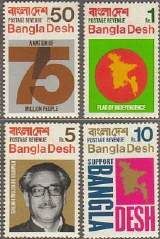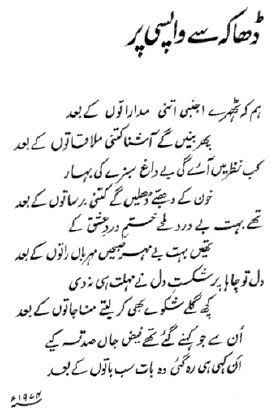Adil Najam
 As the fourth part of our series on the events of 1971, we are reposting this post which was first published at ATP on December 16, 2006. We are reposting it with all the original comments since they, as a whole, are very much part of the conversation we all need to have with ourselves. The previous three parts of the series can be read here, here and here.
As the fourth part of our series on the events of 1971, we are reposting this post which was first published at ATP on December 16, 2006. We are reposting it with all the original comments since they, as a whole, are very much part of the conversation we all need to have with ourselves. The previous three parts of the series can be read here, here and here.
Today is December 16.
Today Bangladesh will mark its 35th ‘Victory Day.’
 Most Pakistanis will go about their lives, not remembering or not wanting to remember. We should remember – and learn – from the significance of this date.
Most Pakistanis will go about their lives, not remembering or not wanting to remember. We should remember – and learn – from the significance of this date.
Not because it marks a ‘defeat’ but because it marks the end of a dream, 24 years of mistakes, horrible bloodshed, traumatic agony, and shameful atrocities. The constructed mythologies of what happened, why, and who is to be blamed need to be questioned. Tough questions have to be asked. And unpleasant answers have to be braced for. We need to honestly confront our own history, for our own sake.
But right now, the goal of this post is different. We at ATP just wish to extend a hand of friendship to our Bangladeshi friends. May the memories we make in our future be very different (and more pleasant) than the scars we carry from our past.
There is much – too much – that I wish to say; but cannot find words for. So let me do what I always do when I am at a loss of words. Let me quote Faiz Ahmad Faiz, who in his memorable 1974 poem ‘Dhaka say wapsi par’ (On Return from Dhaka) expressed what I wish to say so much better than I ever could.
We share with you here the original poem in Urdu, a version in ‘Roman Urdu,’ a wonderful English translation of the poem by the late Agha Shahid Ali in his book The Rebel’s Silhouette, and a video of Nayarra Noor singing the verses with the passion and feeling that they deserve.
ham ke Thehre ajnabi itni mulaaqaatoN ke baad
phir baneiN ge aashna kitni madaaraatoN ke baadkab nazar meiN aaye gi be daaGh sabze ki bahaar
khoon ke dhabe dhuleiN ge kitni barsaatoN ke baadthe bahut bedard lamhe khat’m-e-dard-e-ishq ke
theiN bahut bemeh’r subheiN meh’rbaaN raatoN ke baaddil to chaaha par shikast-e-dil ne moh’lat hi na di
kuchh gile shikwe bhi kar lete manaajaatoN ke baadun se jo kehne gaye the “Faiz” jaaN sadqe kiye
an kahi hi reh gayi woh baat sab baatoN ke baad
Agha Shahid Ali’s Translation:
After those many encounters, that easy intimacy,
. we are strangers now —
After how many meetings will we be that close again?When will we again see a spring of unstained green?
After how many monsoons will the blood be washed
. from the branches?So relentless was the end of love, so heartless —
After the nights of tenderness, the dawns were pitiless,
. so pitiless.And so crushed was the heart that though it wished
. it found no chance —
after the entreaties, after the despair — for us to
. quarrel once again as old friends.Faiz, what you’d gone to say, ready to offer everything,
. even your life —
those healing words remained unspoken after all else had
. been said.




















































In all fairness, what happened in East Pakistan can not be blamed on Pakistani civilians, specially those who were not even born. It was the Pakistani Army that committed the crimes. But in India the Sikh genocide of 1984, Muslim genocide of 1992 and 2002 was committed by civilians and no one has been punished for any one of them. The Indian writes on this post would be well advised to look into their own actions. We should put our own house in order first before pointing fingers at others.
The discussion in this blog is too good where views are very newtral and par excellence . As i am not aware of the developments at that time , i want to know whether Post Card, Moneyorder form , stamp paper, treasury papers etc were printed in Urdu only and or in 2 langauages ( Urdu + State language ).If its former then its problematic and if its latter then its vested intereests taken over the issue .
[quote post=”471″]First is the role to Urdu in flaring Bengali nationalism. Qaid-e-Azam, against the advice of Sir Agaha Kahn decided to make Urdu as a national language. Under democratic principles,Bengali could have easily become the national language.[/quote]
I agree with every point raised by EP people at that time but not this urdu one. Being in majority dosn’t mean that a regional language should be imposed on a country. When we say a natiional language, it means that everyone could understand it without any particular region influence therefore choosing Urdu as a national language was not a wrong decision at all. By national language doesn’t mean you can’t speak in local lanugage. Pakistan’s national language is Urdu but majority speaks Punjabi. Urdu didn’t damage their regional image.
Arabic was also not a good choice because majority of muslims in 19th century were not used to speak Arabic like their forefathers who migratted from Iraq and other arabic countries plus converted muslims had no arabic background therefore Arabic was like an outsider language for them and couldn’t gain any popularity plus non-muslim Pakistanis could reject to accept a language which have religious influence.
Jai Bangla
Pakistan Zindabad
My greetings to all Bangladeshis.
May all of us live in peace, always.
I am happy that Bangladesh is a separate country now, although the way these countries got separated was painful and the responsibility lies on the residents of DHA socities.
My best wishes and happy independence to Bangladeshis. I would also like to mention Biharis who wanted to live in a Muslim country and their wish came true, be happy and be grateful towards your Bengali brothers who allowed you to live peacefully in their wonderful country.